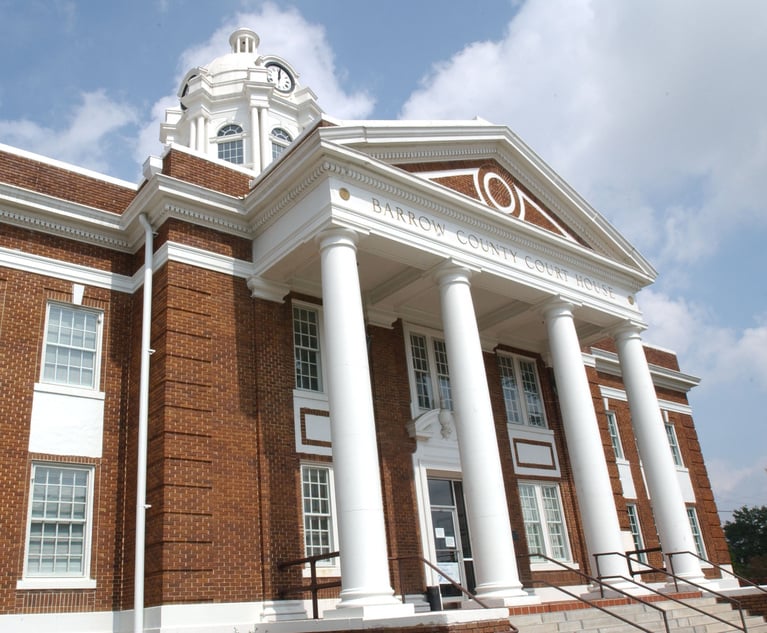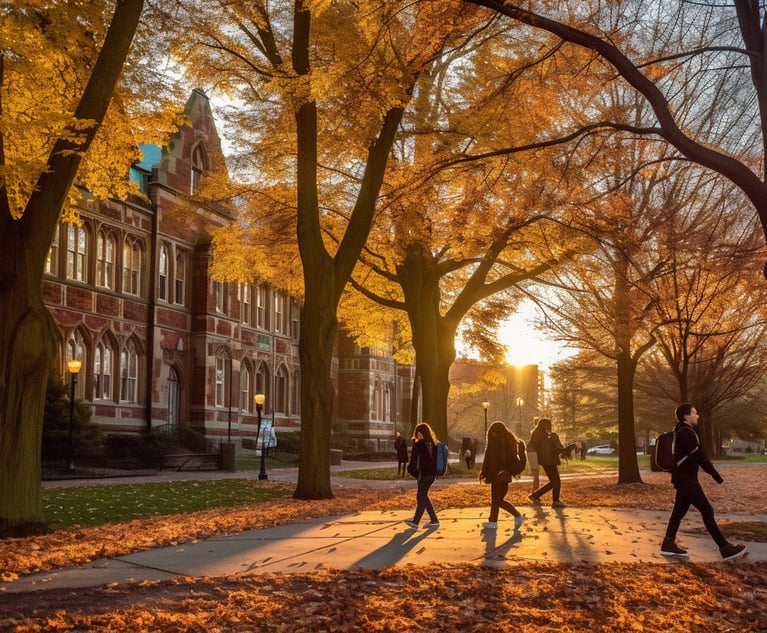'Nobody Is Recruiting Over the Summer': OCI Season Postponed
Moving on-campus interviews from late summer into late fall or early winter will give students some breathing room and give law firms some time to better assess their hiring needs, career services deans say.
April 02, 2020 at 12:47 PM
6 minute read
The original version of this story was published on Law.com
 (Photo: Shutterstock)
(Photo: Shutterstock)
Law firms won't be recruiting summer associates in late July and early August this year.
All but one of the so-called T-14 law schools by Thursday had announced postponements to their on-campus interview programs due to the coronavirus pandemic, and a growing number in the top 50 of the U.S. News & World Report rankings–including Emory University School of Law–have followed suit.
Columbia Law School, which sends a higher number of graduates into associate jobs at large firms than any other school, became the first to postpone OCI on March 23. But the movement picked up steam this week when Harvard Law School, New York University School of Law and the University of Pennsylvania Carey Law School joined the list of campuses delaying summer associate recruiting. Northwestern University Pritzker School of Law is the one T-14 school that hasn't yet announced a delay.
"Nobody is recruiting over the summer," said Harvard career services Dean Mark Weber. "It's off the table. I think January will become the new August."
The delays are the result of numerous factors, but law firms initiated the push to hold off on recruiting programs that bring partners to campus for hundreds of screening interviews with incoming 2Ls.
First, it's not clear that those in-person interviews will even be possible in the late summer if social distancing rules remain in effect.
Second, firms are already dealing with significant economic fallout of the pandemic and uncertainty of their futures and staff needs. The past two weeks have brought news of law firms laying off staff and associates, withholding partner pay and furloughing associates. That means hiring summer associates who will go on to become the firm's new associate class in 2022 would come at a time when firms know little about what their staffing needs will be two years ahead of time. If firms moved ahead with hiring over the summer, they'd likely hire half as many summer associates, Weber noted.
Third, many law firms have delayed the start of their upcoming summer associate programs, pushing them later into the summer. They do not have the desire or the capabilities to simultaneously run those programs—many of which will now be completed remotely—while also juggling summer associate recruiting.
And finally, most Big Law feeder schools have adopted pass/fail grading for the spring semester. Law firms want to see at least two semesters of grades when making summer associate hiring decisions. Delaying the hiring process should give them more than one semester of grades to evaluate.
"I firmly believe that the January schedule is the best solution to this current problem," said Gavin White, the global hiring partner at Skadden, Arps, Slate, Meagher & Flom. "I'd go further and say that I hope we can continue with the January schedule in future years."
White said he has not heard any law school say that it intends to hold summer associates interview programs in July or August, though not all have committed to a January timetable.
Yale Law School, Stanford Law School, the University of Chicago Law School, the University of Michigan Law School and Duke Law School are among the schools that have told students that OCI is postponed until late fall or early 2021, but have not committed to a more specific timetable. Other schools, including Columbia, Harvard, NYU, the University of Virginia School of Law and the University of California, Berkeley School of Law have said OCI will now be in January.
Still others, including Georgetown University Law Center and the University of California at Los Angeles School of Law, have said January or February are both under consideration.
"I know that our law school and legal employer members are actively working through the impact of the current situation on summer programs and recruiting plans," said James Leipold, executive director of the National Association for Law Placement. "During the current state of civil emergency, the NALP board of directors does not believe that there can be uniform solutions that will serve all institutions, but they do believe firmly that there are a multiplicity of solutions that will preserve the fundamental values of fairness, access, and transparency to which NALP is committed."
Weber said that most students at Harvard welcomed Tuesday's news that the summer associate recruiting program will be delayed until January.
"Most students really appreciated the move," he said. "It's one less thing for them to worry about."
In its email to students last week announcing the delay of summer associate interview, Chicago's career services office noted some advantages to the new winter recruiting schedule.
"This has many benefits for you, including giving you more time to research employers, to explore practice areas through research and classes, and to work with us on your job search strategies," the email reads.
Postponing OCI essentially gives both students and law firms some time and breathing room to make plans amid the rapidly changing situation, and the delay gives the pandemic time to subside before hiring takes place, Weber noted. Even under that rosy scenario, career services offices are bracing for hiring slowdowns.
"We know next year won't have the same kind of robust hiring that we've seen for the past two years," Weber said. "That's not hard to figure out."
But Berkeley Law Dean Erwin Chemerinsky wrote in an email to students Monday that delaying OCI until January gives them the best possible chance at securing a summer associate position under the difficult circumstances brought on by the coronavirus outbreak.
"Employers will have a much better sense of their hiring needs in January than in August and there is reason to hope that they will be able to do more hiring at the later time," he wrote. "Most of all, it is clear that employers would prefer this shift."
This content has been archived. It is available through our partners, LexisNexis® and Bloomberg Law.
To view this content, please continue to their sites.
Not a Lexis Subscriber?
Subscribe Now
Not a Bloomberg Law Subscriber?
Subscribe Now
NOT FOR REPRINT
© 2025 ALM Global, LLC, All Rights Reserved. Request academic re-use from www.copyright.com. All other uses, submit a request to [email protected]. For more information visit Asset & Logo Licensing.
You Might Like
View All
From 'Confusing Labyrinth' to Speeding 'Roller Coaster': Uncertainty Reigns in Title IX as Litigators Await Second Trump Admin
6 minute read
University of Georgia School of Law Finds Next Dean on Its Own Faculty
3 minute read
Teen Charged in Barrow School Shooting and His Father to Stay in Custody After Hearings
5 minute readLaw Firms Mentioned
Trending Stories
- 1Reviewing Judge Merchan's Unconditional Discharge
- 2With New Civil Jury Selection Rule, Litigants Should Carefully Weigh Waiver Risks
- 3Young Lawyers Become Old(er) Lawyers
- 4Caught In the In Between: A Legal Roadmap for the Sandwich Generation
- 5Top 10 Developments, Lessons, and Reminders of 2024
Who Got The Work
J. Brugh Lower of Gibbons has entered an appearance for industrial equipment supplier Devco Corporation in a pending trademark infringement lawsuit. The suit, accusing the defendant of selling knock-off Graco products, was filed Dec. 18 in New Jersey District Court by Rivkin Radler on behalf of Graco Inc. and Graco Minnesota. The case, assigned to U.S. District Judge Zahid N. Quraishi, is 3:24-cv-11294, Graco Inc. et al v. Devco Corporation.
Who Got The Work
Rebecca Maller-Stein and Kent A. Yalowitz of Arnold & Porter Kaye Scholer have entered their appearances for Hanaco Venture Capital and its executives, Lior Prosor and David Frankel, in a pending securities lawsuit. The action, filed on Dec. 24 in New York Southern District Court by Zell, Aron & Co. on behalf of Goldeneye Advisors, accuses the defendants of negligently and fraudulently managing the plaintiff's $1 million investment. The case, assigned to U.S. District Judge Vernon S. Broderick, is 1:24-cv-09918, Goldeneye Advisors, LLC v. Hanaco Venture Capital, Ltd. et al.
Who Got The Work
Attorneys from A&O Shearman has stepped in as defense counsel for Toronto-Dominion Bank and other defendants in a pending securities class action. The suit, filed Dec. 11 in New York Southern District Court by Bleichmar Fonti & Auld, accuses the defendants of concealing the bank's 'pervasive' deficiencies in regards to its compliance with the Bank Secrecy Act and the quality of its anti-money laundering controls. The case, assigned to U.S. District Judge Arun Subramanian, is 1:24-cv-09445, Gonzalez v. The Toronto-Dominion Bank et al.
Who Got The Work
Crown Castle International, a Pennsylvania company providing shared communications infrastructure, has turned to Luke D. Wolf of Gordon Rees Scully Mansukhani to fend off a pending breach-of-contract lawsuit. The court action, filed Nov. 25 in Michigan Eastern District Court by Hooper Hathaway PC on behalf of The Town Residences LLC, accuses Crown Castle of failing to transfer approximately $30,000 in utility payments from T-Mobile in breach of a roof-top lease and assignment agreement. The case, assigned to U.S. District Judge Susan K. Declercq, is 2:24-cv-13131, The Town Residences LLC v. T-Mobile US, Inc. et al.
Who Got The Work
Wilfred P. Coronato and Daniel M. Schwartz of McCarter & English have stepped in as defense counsel to Electrolux Home Products Inc. in a pending product liability lawsuit. The court action, filed Nov. 26 in New York Eastern District Court by Poulos Lopiccolo PC and Nagel Rice LLP on behalf of David Stern, alleges that the defendant's refrigerators’ drawers and shelving repeatedly break and fall apart within months after purchase. The case, assigned to U.S. District Judge Joan M. Azrack, is 2:24-cv-08204, Stern v. Electrolux Home Products, Inc.
Featured Firms
Law Offices of Gary Martin Hays & Associates, P.C.
(470) 294-1674
Law Offices of Mark E. Salomone
(857) 444-6468
Smith & Hassler
(713) 739-1250







